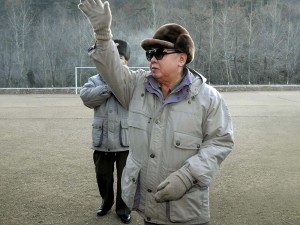SEOUL, Korea – The Internet is virtually banned, there’s no free press and listening to foreign radio is illegal – if any country can build a Stalinist-style personality cult in the digital era, it’s North Korea.
Following the death of its longtime “Dear Leader” Kim Jong-Il on December 17, the repressive communist regime’s propaganda machine has swung into action to burnish the image of his youngest son and successor, Jong-Un.
The North’s official news agency reported that on Sunday Jong-Un sent hot sweet drinks to mourners braving wintry conditions to pay their respects to his late father.
“He is such a meticulous and tender-hearted man,” it said. “The loving care repeatedly shown by Kim Jong-Un for people when the whole nation is overcome with sorrow will be conveyed to posterity as a legend about love for people.”
The previous day Jong-Un was hailed for rushing fresh fish to the citizens of Pyongyang to fulfil his father’s last wish.
He still has a long way to go to match Kim Jong-Il’s many extraordinary feats, which included 11 holes-in-one in a single round of golf.
The outlandish myths about the “Dear Leader” made him a figure of fun and ridicule in the West. But in North Korea the numerous legends helped to perpetuate his 17 years in power, along with prison camps and a massive army.
Kim’s picture hangs inside every North Korean home, while propaganda posters hail the late leader and his father, founding president Kim Il-Sung. From an early age, schoolchildren sing the praises of the two men.
They are taught that rainbows appeared over the sacred Mount Paekdu at the time of Kim Jong-Il’s birth there, although experts believe he was born in a Russian guerrilla camp.
While Kim’s death was mocked overseas on Twitter as an “epic loss to golf”, few North Koreans are likely to see the remarks.
Social media helped to galvanize Arab Spring uprisings in the Middle East and North Africa in 2011, but under the world’s last remaining communist dynasty, surfing the web is impossible for most ordinary people.
There is a nationwide Intranet system called Kwangmyong but it is tightly controlled and does not provide a window to the outside world.
“North Korea is still run as if it’s the 1950s or 1960s,” said professor Andrei Lankov, a North Korea specialist at Seoul’s Kookmin University.
“There are a surprisingly large number of computers around but they are not connected to the Internet, which is banned. All official radios have fixed tuning so you can listen only to the official broadcast,” he said.
That means it will not be hard for North Korea to recreate the same kind of personality cult for the younger Kim as it did for his father, he said.
The senior Kim did show signs of being somewhat Internet-savvy. When then-US secretary of state Madeleine Albright visited Pyongyang in 2000, the late leader reportedly asked for her email address.
Yet North Korea remains one of the world’s most closed nations. Most of its citizens are banned from travelling abroad and visitors to the country are typically closely monitored and not permitted to stray from the capital.
A ban on mobile phones has been lifted and the North had more than 800,000 registered subscribers as of the end of September.
Seoul activists say it is difficult for users to make or receive overseas calls because of limited service and tight oversight.
But information from outside is slowly seeping in, through smuggled mobile phones which connect to Chinese networks near the border and South Korean DVDs and videotapes imported clandestinely.
“Thanks to the spread of these videos North Koreans came to realize that the official story about poor, desperate South Korea is a lie,” said Lankov.
“North Koreans finally came to realize they are lagging behind. However, few of them realize how far behind.”
Even so, Pyongyang still has a tight grip on news, keeping the world in the dark about Kim Jong-Il’s death for two days until the shock announcement on Monday last week by a weeping news presenter.
It is impossible to know how many of the tears shed in North Korea for the late leader are genuine, but people who fled Kim’s harsh rule say that it is partly the result of years of indoctrination.
“The North’s brainwashing is so strong that I found myself crying at the news of Kim Jong-Il’s death even though I defected years ago and have publicly said I hate him,” said Lee Hae-Young, director of the Seoul-based Association of North Korean Defectors.
“The slavery mentality is so deeply ingrained in the North Korean people because of propaganda and brainwashing.”
